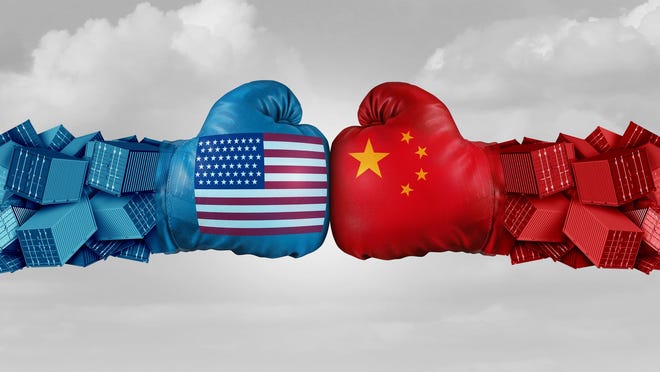“Biden vs. Trump: You saw them in town halls, how do they differ on international stage?”, USA Today
Kim Hjelmgaard, Deirdre Shesgreen, Claire Thornton, Michael Collins, World, October 16, 2020
For the last four years the Trump administration’s approach to foreign policy from trade to immigration, and from climate change to North Korea, has been defined by its departure from convention. International treaties have been abandoned, allies ignored or scorned and the idea of U.S. leadership and credibility on the world stage tested.
Trump has also claimed successes, such as withdrawing U.S. troops from overseas conflicts and acting as a broker for improved relations in the Middle East.
Democrat Joe Biden has vowed to reverse many of Trump’s decisions, but Biden’s foreign policy might not give the world as much whiplash as some may expect.
Trump vs. Biden: What each president would mean for the military
Here’s how a second term for Trump’s foreign policy could be expected to play out versus a first presidential term for Biden.
China: Two courses, both set on confrontation

Under Trump: Trump has strained relations with China by characterizing Beijing as a threat to American security and prosperity. He has attempted to confront China in economic terms by pursuing an ambitious trade deal, an effort that suits his view of himself as a dealmaker. But the second phase of the agreement has stalled because of the coronavirus pandemic, which Trump has branded the “China virus” to the annoyance of Beijing, and over tensions connected to a security law Beijing imposed on Hong Kong that tramples on the city-state’s prized autonomy.
The early months of Trump’s presidency saw him lavish praise on Chinese President Xi Jinping, but take little interest in China’s expanding international ambitions, human rights record, aggressions in the South China Sea, or the need to cooperate on global issues, such as climate change. It’s ultimately unclear how far Trump would be willing to push China and risk decoupling the world’s two largest economies. He has imposed limited economic sanctions on China over Hong Kong and for rights violations in China’s campaign targeting Muslim minorities in the Xinjiang region.
OPINION: US must stop Chinese concentration camps
Under Biden: The veteran politician from Delaware is also likely to adopt a tough stance on China if elected.
“If China has its way, it will keep robbing the U.S. of our technology and intellectual property, or forcing American companies to give it away in order to do business in China,” Biden said in a speech last year.
But true to his multilateralist instincts, and unlike Trump, Biden would almost certainly seek to “build a united front of friends and partners to challenge China’s abusive behavior,” as he noted in that same address.
Benjamin H. Friedman, policy director at Defense Priorities, a Washington, D.C.-based security think tank, said that while Biden would be “tougher” on China in terms of raising concerns about its human rights abuses against, for example, on Muslim minority Uighurs held in Chinese government-run detention centers.
“I’d expect a less confrontational rhetorical approach overall, meaning less bluster of the sort (U.S. Secretary of State) Pompeo specializes in, which tends to damage relations for no good reason beyond domestic political assumption,” Friedman said.